Top 10 things that should have been in the 1912 package.
Last week, the breaths of many around the world were bated as in Otta, Norway, a package that had been presented to the town by its mayor, Johan Nygard, in the 1920s and that had the words "Do not open until 2012" was finally opened. What was in the package: "the package contents seem to be primarily concerned with the construction of a monument to celebrate the victory [of the battle of Krinsberg] in 1612.
" If Nygard had not preserved these trivialities in an overblown mystery, the contents would probably have been thrown out ages ago. But for a brief moment, there was the chance of something unusual. In honor of that moment, the top 10 things that should have been in the package.
10. A history of the last 100 years.
9. A book written in an unbreakable code.
8. A package traveling backward in time saying "Do not open until 1912."
7. A powder that, when water was added, would reconstitute itself into Johan Nygard.
6. The desiccated remains of a tiny alien.
5. Documents about the construction of a monument to commemorate the battle of Krinsberg, written in blood.
4. A remarkable worm said to be unknown to science.
3. A salacious, obscenity-filled epic rant about life as mayor of a small Norwegian town.
2. A notebook containing the identity of Jack the Ripper, the purpose of the Oak Island money pit, the location of the Ark of the Covenant, etc., etc.
1. The greatest, most complicated lutefisk recipe ever.
Top Films of the 2000s
The New World (Terrence Malick)
Crouching Tiger, Hidden Dragon (Ang Lee)
Master and Commander: The Far Side of the World (Peter Weir)
Tears of the Black Tiger (Wisit Sasanatieng)
2046 (Wong Kar-wai)
My Winnipeg (Guy Maddin)
Pistol Opera (Seijun Suzuki)
The Prestige (Christopher Nolan)
The Royal Tenenbaums (Wes Anderson)
24 Hour Party People (Michael Winterbottom)
Happy 100th, Louise!
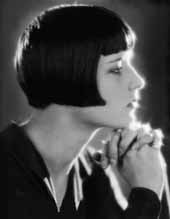
Happy 100th, Dmitri!

Where Are My Elephants?
The Protector
(Prachya Pinkaew, 2005) ****
The version of this movie that is currently playing in US theaters is 25 minutes shorter than the original Thailand cut. I assume that everything in this movie that is not martial arts has been tossed. There is very little connective tissue in this movie. That is, any sort of mystery element of how Tony Jaa finds out where his elephants are is no longer here and is obvious by its absence. Now I've long been one of those movie buffs who did not approve of the Weinstein brothers' habit, first at Miramax and now at The Weinstein Company, of cutting foreign movies for the American market. However, I am not that indignant this time. Why?
1. Pinkaew's previous Muay Thai extravaganza,
Ong Bak, took 35 minutes to get going. Is anyone longing for more city-mouse-country-mouse byplay between Tony Jaa and his sidekick? Pinkaew does not have a good record when it comes to narrative setup.
2. When Tony Jaa is not kicking ass, he does not light up the screen with his presence. He has neither the charm of Jackie Chan nor the charisma of Jet Li. He is just a pretty athletic guy. I do not weep for the lost scenes of Tony Jaa's dramatic acting that I was denied.
3. What remains is so entertaining that any of the martial arts sequences on its own would be worth full ticket price. Once Tony Jaa gets going, the world is his jungle gym. There is one long take around some abandoned streetcars in which Tony hurtles through windows and swings around on the metal bars inside, sending his enemies flying hither and yon. There is another long take in which he finds behind a nondescript Thai restaurant, a multistory atrium surrounded by a spiral staircase and whose different levels can be found everything from hookers to a restaurant serving endangered species. Tony runs up the stairs to the first landing and fights someone on the first landing, out of our view (the camera, acting as a character, seems reluctant to follow Tony at first). The nameless assailant is then thrown through the balustrade that concealed our view. Tony has to fight his way back down to the lobby by which time the camera has summoned up enough courage to follow our hero all the way to the top in one unbroken take in which many bodies, much furniture, and a sink are thrown.
4. Elephants. This has the same plot as Ong Bak. Bad guys from the city come to the countryside to steal a piece of Thai culture, in this case, two elephants bred for use of
the King. The elephants here are as satisfying in their monumental pachydermness as those in Oliver Stone's Alexander (whose elephants were easily the best part of that film).
A Quotation
"Darius the king thus says: In the protection of Ahuramazda there is also much which I have done which is not written on this stele; for this reason it has not been written lest he who should read this writing hereafter should not believe all I have done, but should speak, saying: 'They are lies.' "
--Darius I (549-486 BC), quoted in History
of the Persian Empire by A. T. Olmstead
Scarcely to be described in words
Dreams from the Witch House by H. P. Lovecraft
I don't mean to add H. P. Lovecraft as an obsession of this blog alongside Raj Kapoor, but he has, like the Bollywood master, become a recent interest. It does seem to be his moment, since he has pretty much entered the canon. He has
a volume in the Library of America. I read this book as a respectable Penguin Classic with
Fuseli's Nightmare on the cover. I've been an sf fan pretty much my whole life, but still reading something as a Penguin Classic that started out in Weird Tales and Astounding Magazine is unexpected.
There are two ways to describe Lovecraft by way of comparison. The first is that he was halfway between Poe and Borges. From Poe comes the horror, and from Borges comes the bibliophilia, the feeling of being trapped in an imaginary library. However, Lovecraft also reminded me of Huysmans' Against Nature. He is a Decadent writer born a generation too late and writing for the pulps. He despises all modern life, but unlike Huysmans, aestheticism is not a way out. No drinking of "yellow teas brought from China into Russia by special caravans" for him. At the bottom of everything are ancient malevolent alien entities as far above us as we are above the amoebas.
Of course, it's very hard to describe what is billions of years ahead of us on the evolutionary chain. So Lovecraft often finds it very hard to describe his vision with any sort of photographic exactness. ("Certain altars and stones suggested forgotten rites of terrible, revolting, and inexplicable nature.") In writing about what cannot, and should not, be imagined, Lovecraft set himself an artistic bar that he couldn't reach. The truly successful Lovecraft story would drive the reader mad.
Abysms of shrieking and immemorial lunacy
The Call of Cthulhu
(Andrew Leman, 2005) ***1/2
The envelope from Greencine was like any other DVD envelope, shewing nothing of the horrors within. Upon pulling the disc out, I was discomfited by the hideous singularity of the lettering thereon. Pressing "play movie" on a menu which faded into the movie in a fashion that bordered on the blasphemous, I was confronted by terrors surpassing those of the mouldier pages of the Pnakotic Manuscripts. Told in the frightful style of the most ancient cinema, this film revealed forbidden horrors that chilled the blood. Of the story, of the frightful dreams of a Providence sculptor, the repulsive statue guarded by a mad Esquimaux shaman, the nightmarish rites of the darkest Louisiana bayous, and the monstrosity slumbering in the ancient depths of the South Pacific, I recoil in fear of mentioning them. I will only give the least disquieting glimpse of these diabolic occurrences.

Shree 420
Shree 420
(Raj Kapoor, 1955) ***1/4
This is a bit more like typical Bollywood in its bagginess. The first hour is almost unnecessary. (It includes that dispiriting sign of comic desparation, fast motion.) Eventually Raj, after flailing around in poverty at a Bombay laundry, discovers his true talent, cheating at cards. I was reminded of three other films.
1. The Middleman (Satyajit Ray, 1976) Sad to say, 20 years later, India still hadn't solved the problem of what to do with its college graduates, the main career choice in both films being either destitution or selling your soul.
2 and 3. Sunrise (F. W. Murnau, 1927) and One Wonderful Sunday (Akira Kurosawa, 1947) Lovers in the city with dilapidated Bombay, reminiscent of postwar Tokyo in the latter film.
And now for the pictures.
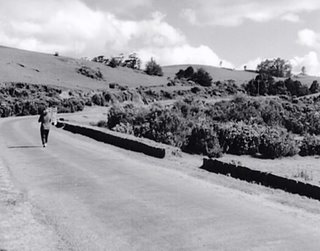
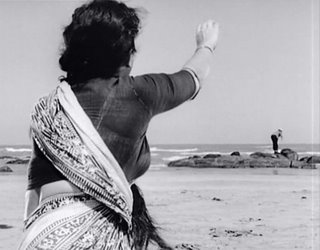

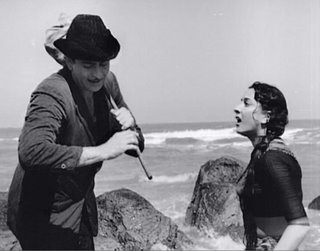
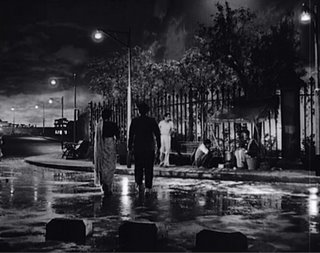
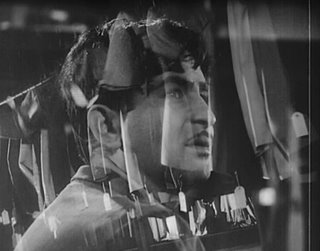
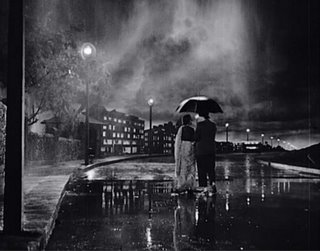
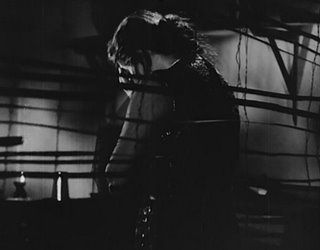
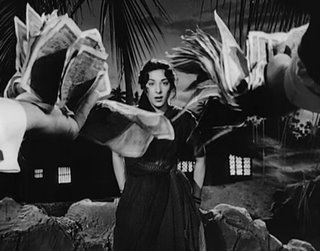
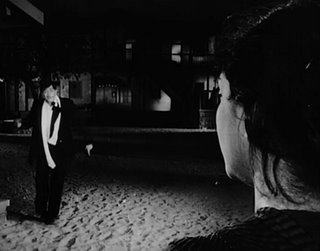
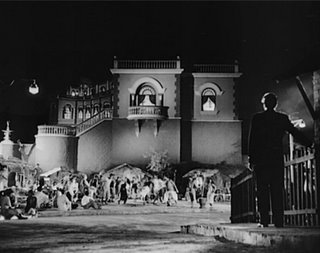
Willy Wonka and the Pornographic Lampoon of Charles II
The Libertine
(Laurence Dunmore, 2004) **1/2
Yet another film that founders on Aristotle's truism that no one's life is a story. This is even more pointless than most, since, based on this film, the accomplishments of John Wilmot, second Earl of Rochester, were
1. Taught Elizabeth Barry (who? exactly) how to act.
2. Wrote a pornographic play.
3. Died horribly from syphilis.
As a character, Wilmot is of even less interest, since he always chooses that which leads to his self-destruction. Other characters praise him as a great wit and poet, but for the former, there is no evidence, and for the latter, he is, at best, middling. Johnny Depp fills this shell, as best he can, with bits from Hunter S. Thompson, Jack Sparrow, and Willy Wonka. One thing this film gets right is that the past was unbelievably dirty with everyone and everything covered with soot, mud, and filth.














